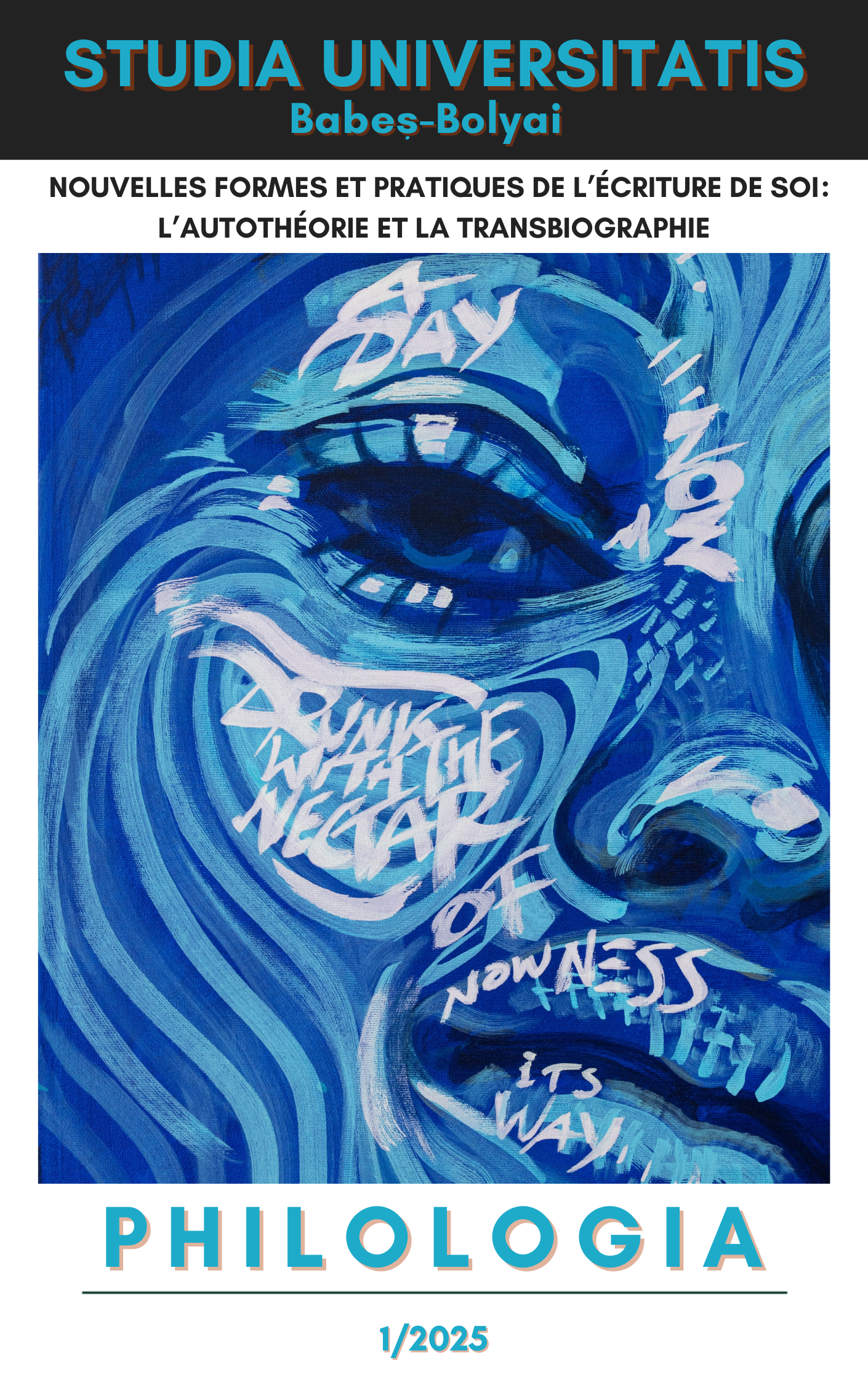LE JOURNAL FILMÉ FÉMININ À LA LUMIÈRE DE L’AUTOTHÉORIE : HISTOIRES DU « MAUVAIS GENRE »
DOI:
https://doi.org/10.24193/subbphilo.2025.1.09Keywords:
diary film, feminism, documentary, French cinema, amateurismAbstract
Women’s Diary-Film in the Light of Autotheory: Stories of the “Bad Gender”. A genre popularised by Jonas Mekas in the 1950s, the film-diary stands on the fringes of Hollywood cinema and its social, political and cultural norms, as well as its aesthetic and narrative conventions. This model of low-cost filmmaking helped to give women access to filmmaking, but also to assert their sexual communities. Autotheory, as a reflexive movement, seems to be able to shed critical light on the way in which these filmed diaries, which are themselves labile works combining personal experience and conceptual thought, resonate with social and political issues. We will be looking at the artistic devices put in place by Sophie Calle in No Sex Last Night (1996), Françoise Romand in Thème Je (2004) and Dominique Cabrera in Grandir (2013). The aim is to analyse the way in which this private cinema, produced by women artists at a relatively advanced age, is an opportunity for them to reflect retrospectively on their biography, their practice and their status as women. The filmic devices, in close dialogue with other media, notably text, provide the backdrop for a critical, feminist discourse on female socialisation and intimate relationships with oneself, one’s body and one’s loved ones.
REZUMAT. Jurnalul video feminin din perspectiva autoteoriei: narațiunile unui „mauvais genre”. Gen popularizat de Jonas Mekas în anii 1950, jurnalul video se situează la granița cinematografiei hollywoodiene și a normelor sociale, politice și culturale, precum și a convențiilor sale estetice și narative. Acest cinema „low-cost” a facilitat accesul femeilor în domeniul cinematografiei, dar a contribuit și la afirmarea apartenenței realizatorilor la o comunitate sexuală sau alta. Autoteoria, ca practică reflexivă, e în măsură să pună într-o lumină critică modul în care aceste jurnale video, ele însele opere fragile care combină experiența personală și gândirea conceptuală, rezonează cu problematici sociale și politice. Astfel, articolul de față analizează dispozitivele artistice propuse de Sophie Calle în No Sex Last Night (1996), de Françoise Romand în Thème Je (2004) și de Dominique Cabrera în Grandir (2013). Vom analiza modul în care acest cinema intim, produs de femei artiste la o vârstă relativ înaintată, le oferă prilejul de a se raporta retrospectiv la propria biografie, la practicile artistice și la propria condiție feminină. Dispozitivele cinematografice, în strâns dialog cu alte medii, în special cu textul, formează contextul unui discurs critic și feminist privind socializarea feminină și raporturile intime cu propriu „eu” , cu propriul corp și cu cei apropiați.
Cuvinte-cheie: jurnal video, feminism, documentar, cinema francez, amator
Article history: Received 3 January 2025; Revised 25 February 2025; Accepted 6 March 2025; Available online 25 March 2025; Available print 30 April 2025.
References
Campan, Véronique. 2005. Le journal aux frontières de l’art. Rennes : Presses Universitaires de Rennes, La Licorne.
Duquet, Emma. 2024. Entretien non publié avec Françoise Romand, mené par Emma Duquet à Paris le 15 novembre 2024.
Edel-Garcia, Inès. 2021. « Dominique Cabrera, cinéaste du récit de soi. » Archipop. https://archipop.org/lemagazine/2021/05/10/cabrera-cineaste-du-recit-de-soi-grandir/.
Goursat, Juliette. 2016. Mises en « je ». Autobiographie et film documentaire. Aix-en-Provence : Presses Universitaires de Provence (PUP).
Lévi-Strauss, Claude. 1962. La pensée sauvage. Paris : Plon.
McFadden Wilkens, Cybelle. 2011. « No Sex Last Night: The Look of the Other. ». Intermédialités, 10 août 2011 : 111 25. https://doi.org/10.7202/1005519ar.
Odin, Roger. 1995. « Du film de famille au journal filmé. » In Le Je Filmé, Paris : Centre Pompidou et Light Cone.
Sauvageot, Anne. 2007. Sophie Calle, l’art caméléon. Paris : Presses Universitaires de France.
Savard-Corbeil, Mathilde. 2023. « L’autothéorie comme forme d’engagement de la littérature contemporaine. » Revue critique de fixxion française contemporaine, no. 27, 15 décembre 2023. https://doi.org/10.4000/fixxion.13271.
Filmographie
Cabrera, Dominique. 2013. Grandir. France : Ad Libitum.
Calle, Sophie. 1996. No Sex Last Night (Double Blind). États-Unis : Paulo Branco.
Romand, Françoise. 2004. Thème Je. France : Françoise Romand.
Downloads
Published
How to Cite
Issue
Section
License
Copyright (c) 2025 Studia Universitatis Babeș-Bolyai Philologia

This work is licensed under a Creative Commons Attribution-NonCommercial-NoDerivatives 4.0 International License.



